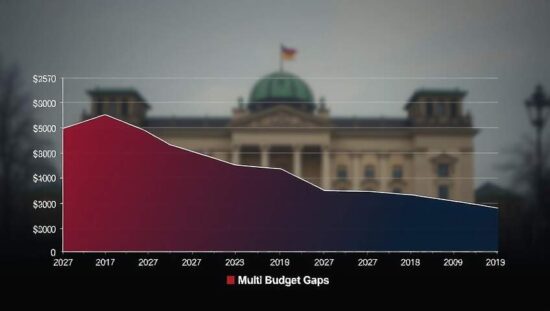A significant budget gap of 144 billion euros is expected to persist from 2027 to 2029, according to the federal finance ministry’s cabinet draft for financial planning, which was sent to other government departments on Monday and reported by the Handelsblatt on Tuesday.
The draft highlights the need to address a 22 billion euro gap in the 2027 federal budget, with a further 56 billion and 66 billion euro gaps in the following two years, respectively.
The reasons for this significant financial challenge are multifaceted. The federal government must start repaying the debts it accumulated during the Covid-19 pandemic from 2028, with an annual repayment of around nine billion euros. Additionally, the high level of indebtedness increases interest costs, with the Handelsblatt reporting that interest costs are expected to rise from 30.2 billion euros to nearly 60 billion euros by the end of the parliamentary term.
A third factor is the mechanism of the debt brake, which, as the government expects the economy to be fully utilized in 2029, will also restrict the government’s credit options. The debt brake allows a net credit of only 4.9 billion euros by the end of the parliamentary term.
Despite the tight financial situation, the special fund for infrastructure and climate protection will enable Finance Minister Lars Klingbeil to increase spending. The Greens’ parliamentary group’s budget spokesperson, Sebastian Schäfer, sees the necessary constitutional amendment as a significant achievement for his party, stating that they put the country’s interests before party interests to clear the way for the coalition to invest.
However, Schäfer also criticized the Chancellor, saying that the enormous new debt was always denied during the election campaign. He referred to Friedrich Merz, who had claimed that small reforms to the citizen’s allowance and bureaucracy reduction could finance all necessary expenses, only to change his stance immediately after the election.





